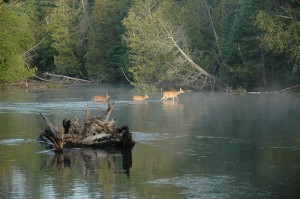Q&A: With climate declaration, Brewery Vivant continues striving to “Beer the Change”
As if making delicious beer wasn’t enough to win us over, America’s craft brewers have also been strong leaders in showing that businesses can thrive while giving back to their communities and finding innovative ways to protect the environment.
Case in point: Two dozen craft brewers announced this week they had signed a Brewer’s Climate Declaration, which says the companies will take action to reduce their greenhouse gas emissions and will engage with policymakers to support political action to halt climate change. Those breweries already are taking steps to reduce energy use, cut transportation emissions and conserve water, among other sustainability measures.
“It’s good for business, it’s not just good for the environment,” Craft Brew Alliance sustainability manager Julia Person told the Huffington Post. “We’re lowering our operating costs. It’s doing the right thing and having a benefit.”
So far, two Michigan companies—Rockford Brewing Company and Brewery Vivant—have signed the declaration.
In reading up about the climate declaration, we were impressed to learn that Brewery Vivant in 2012 became the first brewery in the country to attain LEED certification from the U.S. Green Building Council. We checked in with co-owner and sustainability manager Kris Spaulding to learn more about how the Grand Rapids brewery is striving to support its community and shrink its environmental impact.
MEC: Why did Brewery Vivant decide to sign on to the climate declaration? More generally, why have you made sustainability such a priority?
Kris Spaulding: Sustainability is one of the values we founded our business on. We believe that a great business exists because of the support of the local community. Therefore a business should be an active member of the community and should strive to find meaningful ways to engage with it and give back to it. These are values we hold personally, but that we believe all businesses should be thinking along the lines of the triple bottom line.
As for the declaration itself, climate change is going to continue to impact our industry and our world so I think it is best to work towards solutions now rather than waiting for more catastrophic events to finally lead to change happening. I like that the declaration challenges businesses to innovate and work towards solutions rather wait and see what someone else will do. Read more













